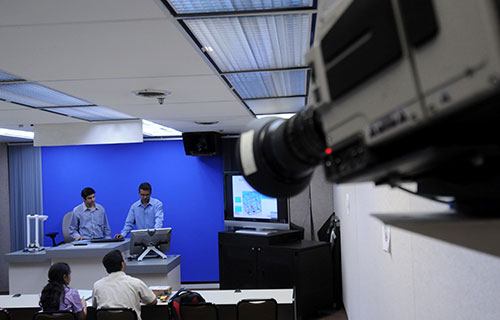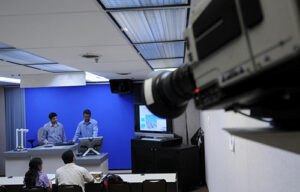Campus boosts funding for lab improvements
Posted by Andrew Careaga

The new course-sharing program combines online, video conferencing and traditional approaches to teaching

Approximately 20 percent of the support for instructional lab upgrades will be used to improve remote access for distance students.
Eleven proposals to upgrade instructional laboratories at Missouri University of Science and Technology will receive funding, thanks to a combination of one-time state funding matched by charitable contributions and other non-appropriated funds, and a commitment by Missouri S&T Chancellor Cheryl B. Schrader to provide additional support for the projects.
Last fall, Schrader announced in her State of the University Address that Missouri S&T had received $500,000 in one-time state funds to improve instructional labs. The funds were awarded through the University of Missouri System’s strategic initiative program based on the strength of S&T’s proposal, which included $500,000 in funds from private donors and other non-appropriated sources. The match of non-appropriated funds with state funds provided a $1 million pool for the laboratory improvements.
Missouri S&T sought proposals from faculty to upgrade labs and received 11. Even though the total cost of the 11 proposals exceeded the $1 million available, Schrader says all are worthy of funding, so she will cover the additional costs from other university sources.
“All of the proposals were incredibly strong and based on clear and compelling student outcomes,” Schrader says. “Each proposal also addressed a specific need that requires our investment if we are to maintain our competitive edge as a university focused on preparing our students for success in increasingly complex and highly technical careers.”
The 11 proposals totaled $1.73 million. Half of that total – or $866,000 – comes in the form of charitable donations or grants secured by the academic departments. Of the other half, $500,000 comes from the one-time state appropriation, and Schrader is pledging to contribute $366,000 from other university funds to ensure all 11 projects are funded.
“We will make it a priority to find the additional funding to support these worthwhile investments,” Schrader says.
She has also made it a priority to ensure the labs are equipped to reach students beyond the campus. Approximately 20 percent of the support for these upgrades will be allocated to ensure the labs provide remote access for distance students.
The projects to receive funding are:
- Computing equipment, software and furnishings for a new Cloud, Virtualization and Big Data Infrastructure Laboratory in the computer science department. The lab will support undergraduate and graduate courses, as well as graduate certificate programs offered by S&T’s computer science, business and information technology, and electrical and computer engineering departments. Missouri S&T’s information technology department will also allocate an additional $100,000 in support of this project.
- Equipment and software upgrades for the physics department to support seven different courses that enroll some 1,000 students each semester.
- Upgrades of process control equipment for the unit operations lab used in three chemical engineering courses. The “unit ops” lab will serve as a showcase lab in Bertelsmeyer Hall, S&T’s new chemical and biochemical engineering building, which opens next fall.
- Installation of a liquid scintillation counter detector at the S&T Reactor. The equipment will be used in the nuclear engineering program’s course, Nuclear Radiation Measurements and Spectroscopy.
- Purchase of a new gas turbine engine and a series of dynamics and control systems experiments for the mechanical and aerospace engineering department to create new instructional lab experiences. The lab upgrades are expected to involve 1,300 students annually across 13 different mechanical and aerospace engineering courses.
- Purchase of a new field flow fractionation (FFF) instrument for use in five courses in the chemistry and chemical and biochemical engineering departments. The FFF instrument is used to separate and detect soluble compounds as well as insoluble particles in solutions, and is important for nanomaterial research.
- Purchase of a new nuclear magnetic resonance spectrometer to be used in two Physical Chemistry Laboratory courses in S&T’s chemistry department. The NMR spectrometer is used to determine the physical and chemical properties of atoms and molecules.
- Upgrades to the microscopes and expansion of the digital visualization system in the geology and geophysics program. The upgrades will benefit students in four undergraduate and seven graduate courses in the program.
- Additional control systems equipment for use in the control systems laboratory in the electrical and computer engineering department. New equipment will be used for a new course on motion control, which is used in manufacturing and factory automation.
- Purchase of a rock test system to be used in mining engineering, petroleum engineering, and geology and geophysics. The equipment will be used in four mining engineering courses and one petroleum engineering course.
- Purchase of a high-temperature, high-pressure rheometer for use in the petroleum engineering program. The instrument is used to analyze fluid flow behaviors and would be used in five petroleum engineering courses.
The proposals for funding were reviewed by a committee chaired by Joan Nesbitt, vice chancellor for university advancement. Other committee members were Dr. Warren K. Wray, provost; Dr. Jeffrey Cawlfield, vice provost for undergraduate studies; Dr. Henry Wiebe, vice provost for global learning; Ted Ruth, director of design and construction management; and Greg Smith, chief information officer.
The proposals had to meet certain criteria in order to be considered. The criteria included alignment with the university’s strategic plan and a measurable impact on student learning outcomes.
Leave a Reply